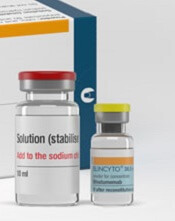
and solution for infusion
Photo courtesy of Amgen
The US Food and Drug Administration (FDA) has granted accelerated approval for blinatumomab (Blincyto®) to treat pediatric patients with Philadelphia chromosome-negative (Ph-) relapsed or refractory B-cell precursor acute lymphoblastic leukemia (BCP-ALL).
The approval is based on results from a phase 1/2 study.
Continued approval of blinatumomab for this indication may be contingent upon verification of clinical benefit in subsequent trials.
Blinatumomab is a bispecific, CD19-directed, CD3 T-cell engager (BiTE®) antibody construct that binds specifically to CD19 expressed on the surface of cells of B-lineage origin and CD3 expressed on the surface of T cells.
In 2014, blinatumomab received accelerated approval from the FDA to treat adults with Ph- relapsed or refractory BCP-ALL. The FDA has also granted the drug priority review, breakthrough therapy designation, and orphan drug designation.
Blinatumomab is being developed by Amgen. Full prescribing information is available at www.blincyto.com.
‘205 trial
The latest accelerated approval of blinatumomab is based on results from the phase 1/2 ‘205 trial, in which researchers evaluated blinatumomab in 93 pediatric patients with relapsed or refractory BCP-ALL.
Amgen said treatment in this study has been completed, subjects are being monitored for long-term efficacy, and the data will be submitted for publication.
Initial results from this study were presented at ASH 2014. The abstract included data on 39 patients with relapsed/refractory BCP-ALL and a median age of 9 (range, 2-16).
The patients received blinatumomab at a dose of 5-15 µg/m²/day. Nineteen patients completed 1 cycle of blinatumomab, 4 completed 2 cycles, and 2 completed 3 cycles.
During the first 2 treatment cycles, 12 patients achieved a complete response, 5 of whom were negative for minimal residual disease.
Six of the complete responders went on to transplant. The median relapse-free survival for complete responders was 5.6 months.
At 6 months of follow-up, the median overall survival for all 39 patients was 4.3 months.
All of the patients experienced adverse events. The most common were pyrexia (74%), anemia (33%), nausea (31%), headache (28%), hypertension (26%), increased alanine aminotransferase (23%), and cough (21%).
The most common grade 3 or higher events were anemia (26%), pyrexia (21%), increased alanine aminotransferase (18%), increased aspartate aminotransferase (18%), and febrile neutropenia (15%).
Three patients developed cytokine release syndrome (2 grade 3).


